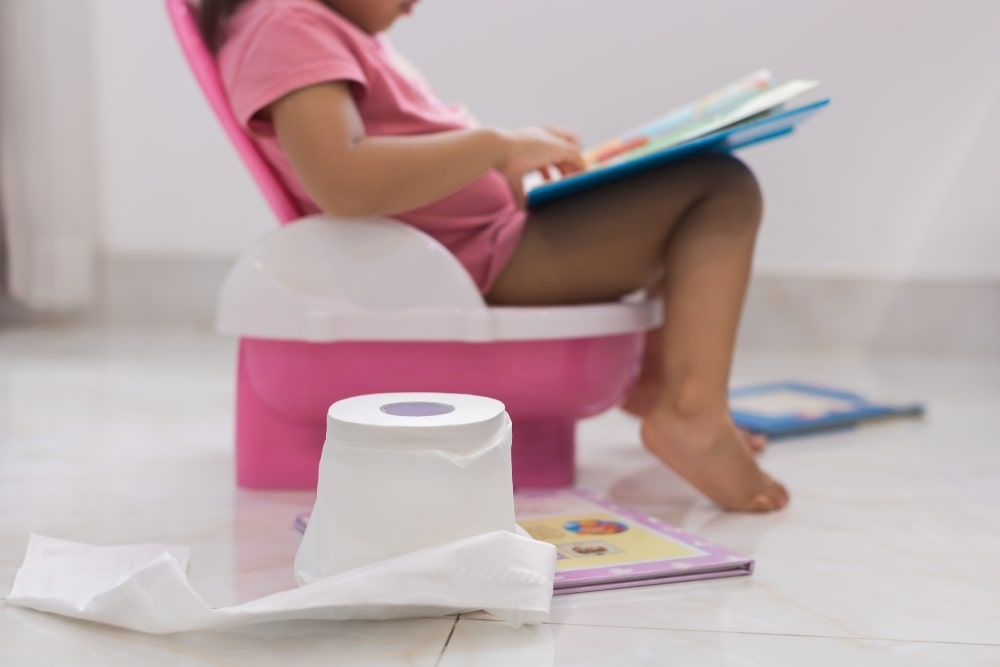Sometimes when we look at our children or other children, we can’t help but compare them. We look at how one is taller than the other, and, occasionally, why one toddler has a potbelly and others don’t.
Having a pot belly as a toddler does not mean that the little one is overweight. There are quite a few perfectly normal reasons for your toddler to have a potbelly.
Alongside that, there are some reasons that are going to require a trip to the doctor’s office.
Reasons Why Your Toddler Has A Pot Belly
When you notice that your little one suddenly has a protruding belly, it can be a tiny bit concerning. Particularly when you notice that some other kids don’t.
You can’t help but wonder why your little one has a potbelly. There are plenty of reasons that their stomach may be protruding, though.
Being Constipated Will Make Their Stomach Stick Out
If your little one hasn’t had a bowel movement in quite a while, it can make their stomach stick out. This is because it is literally full of poop. Other signs of constipation include:
- A hard abdomen
- Abdominal pain
- Hard stool
- Difficulty passing stool
- Painful bowel movements
- Accidents in between bowel movements
- Extended stomach
It’s normal for toddlers to get constipated every so often. Yet, if your little one is constipated more than every so often, or their condition lasts for a week or two, it’s important to contact your pediatrician.
For normal bouts of constipation, try these ideas:
- Document bowel movements to ensure it is not a serious issue
- Make sure your little one is properly hydrated, and drinking plenty of water
- Increase fiber in the diet
- Decrease processed foods and dairy
- Consider changes in diet that might have brought on constipation
- Make sure your little one is comfortable (when children are uncomfortable, they might hold in their bowel movement. This can make constipation worse, or could be the cause behind constipation.)
- Encourage plenty of exercises. This can help with bowel movements.
- Encourage going to the bathroom at the same time every day to promote wonderful bowel habits in your little one
If you try this and don’t see improvement, consider calling your pediatrician. They can prescribe medicine to help with this on a temporary basis.
View in gallery
When a toddler’s potbelly is due to constipation, you’ll notice that their stomach is not as big after a bowel movement. It seems to deflate.
Underdeveloped Stomach Muscles Cause A Pot Belly
It takes time for children to develop stomach muscles. They aren’t born with them. None of us are, in fact.
You’ll see this in them having a little bit of extra weight in the middle area, or by them having a potbelly. This typically will be gone by the time they are 4-5 years old.
Severe Malnourishment
I think that we have all seen commercials of children in countries where they do not have the resources that other countries do. Occasionally, you’ll see a child that appears to be so skinny you cannot imagine how it’s possible for them to have a potbelly.
This is because they do not have enough protein in their diet. They might also be lacking several other vitamins and nutrients. The end result is that the body retains water, making the stomach bloated. It’s this bloating that causes a potbelly.
Other children that do not have enough protein in their diet are more likely to develop a potbelly, too. This can be because they have consumed too much processed food in their diet.
Bloating Makes The Stomach Stick Out
While being malnourished causes bloating, that’s only one cause. Other things can cause bloating, such as gas and food intolerances.
If your little one eats a lot of bread, it can make them gassy. Lactose intolerant children that consume milk will also feel bloated, and appear bloated.
You’ll notice that their pants suddenly don’t button as well as they did yesterday. This is because they are bloated, and it will pass. If bloating is a consistent problem, consult your pediatrician.
Celiac Disease
Celiac Disease is the result of a gluten allergy or intolerance. It has several symptoms, such as abdominal pain. One of the symptoms is also a potbelly.
If you notice that your little one has a potbelly combined with other symptoms, make sure to call your pediatrician. It’s always better to be safe instead of sorry.
View in gallery
Overeating Can Cause A Distended Stomach In Toddlers
If your little one really liked dinner and ate more than their fair share, that could be the culprit. The food that we eat all makes its way into our stomachs.
If there is a lot of food, it will give your little one the appearance of a pot belly because they are so small. This is normal, and it should go away when the food is digested.
When you notice your toddler overeating daily, it’s important to help them control portion sizes. If you don’t, it lays the foundation for unhealthy eating habits when they get older. This can result in eating disorders and childhood obesity.
Swallowing Air
If your little one swallows air, it can give them both gas and make their stomach swollen. Until they pass gas, the air will still be in their stomach.
Some foods naturally contain more air, such as carbonated beverages and bread. Eating fast, drinking beverages with a straw, and chewing gum regularly can also result in swallowing a lot of air.
If this happens daily, you’ll wind up thinking that your little one has a potbelly even though they have a swollen stomach.
Consider When It Started To Help Determine If It’s Normal
While it’s normal for children to have a potbelly, especially toddlers, there are medical conditions that can cause this. If you’re already sick with worry, take a deep breath.
Then, think about when your little one developed their potbelly. Has it always been there? Is it recent?
If your toddler suddenly woke up with a protruding stomach that was not there the day before, it’s not normal and you need to call your doctor.
However, if they’ve always had a little bit of a potbelly, don’t worry about it. It will go away as your toddler gets closer to school age.
Check For Other Symptoms
If your toddler has a potbelly accompanied by other symptoms, such as stomach pain or a fever, that’s a reason to be concerned. It could be that they are constipated due to a virus.
On the other hand, it could be something more serious. When you notice that other symptoms are present, give your pediatrician a call to make sure that your little one is okay.
In Conclusion
It’s perfectly normal for toddlers to have a potbelly. Most of them do! However, if you notice other symptoms or unhealthy eating habits, double-check with your pediatrician to make sure that your toddler is okay.






